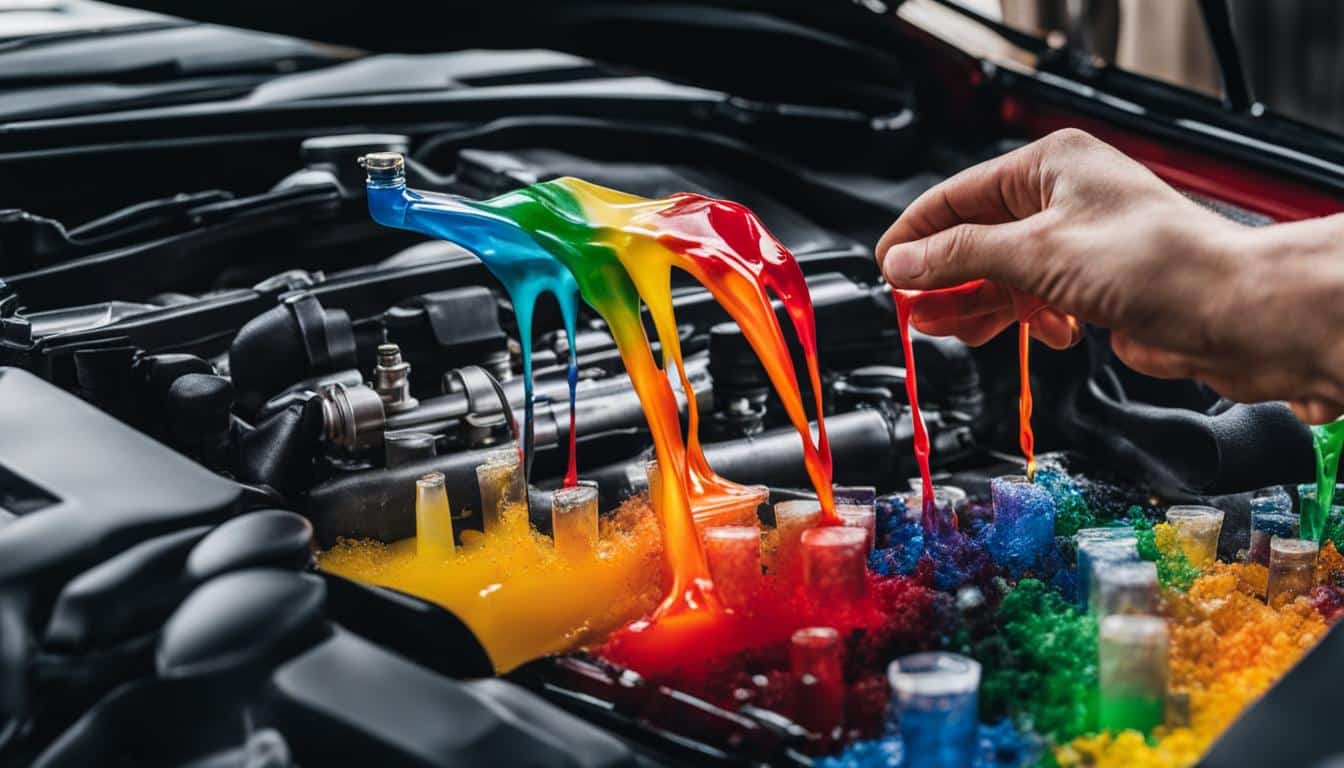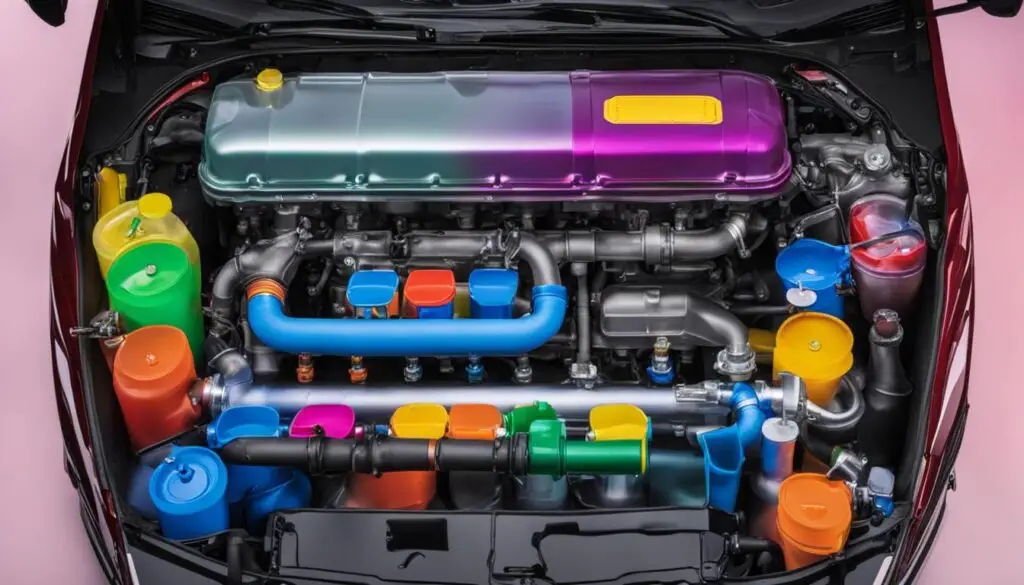
The Complete Guide to Car Fluid Maintenance
As a car owner, you must understand the importance of car fluid maintenance to keep your vehicle running smoothly. Regular maintenance not only prolongs the lifespan of your car but also ensures a safer and more reliable driving experience on U.S. roads. In this section, I will provide you with a comprehensive guide to car fluid maintenance, covering the best practices to follow and how it can benefit your vehicle. By the end of this guide, you will have a better understanding of how to maintain your car fluids and the frequency at which you should do so.
Key Takeaways:
- Regular car fluid maintenance is crucial for a safer and more reliable driving experience.
- Proper maintenance can extend the lifespan of your car and enhance its performance.
- Following best practices and a regular maintenance schedule is essential for proper car fluid maintenance.
- Checking and maintaining car fluids at the recommended frequency can prevent costly repairs and breakdowns.
- Understanding the significance of each car fluid and its maintenance requirements is beneficial for both your car and your driving experience.
Tips for Maintaining Car Fluids
Proper car fluid maintenance is essential for keeping your vehicle in top condition and avoiding costly repairs. By following these tips for maintaining car fluids, you can keep your car running smoothly and avoid potential breakdowns on the road.
Regularly Check Fluid Levels
One of the best ways to maintain car fluids is to regularly check fluid levels. This means checking your oil, coolant, transmission fluid, brake fluid, and power steering fluid on a routine basis. Checking your fluid levels is easy and only takes a few minutes.
To check your oil, make sure your car is parked on a level surface, and the engine is off. Locate the dipstick, remove it, and wipe it clean. Reinsert it and remove it again to read the oil level.
To check your coolant, make sure your engine is cool, locate the coolant reservoir, and check the level. If the level is low, add more coolant.
To check your transmission fluid, make sure your engine is running, and the car is in park. Locate the dipstick, remove it, and wipe it clean. Reinsert it and remove it again to read the fluid level.
To check your brake fluid, locate the brake fluid reservoir under the hood, and check the level. If the level is low, add more brake fluid.
To check your power steering fluid, locate the power steering fluid reservoir, and check the level. If the level is low, add more power steering fluid.
Perform Regular Flushes and Replacements
In addition to checking fluid levels, it’s important to perform regular flushes and replacements of your car fluids. This ensures that your fluids are clean and functioning correctly.
For example, it’s recommended to change your engine oil every 5,000 to 7,500 miles, depending on the manufacturer’s recommendations and your driving habits.
It’s also recommended to flush your coolant system every two years or 30,000 miles and replace your transmission fluid every 50,000 to 100,000 miles.
Follow a Car Fluid Maintenance Checklist
To stay on top of your car fluid maintenance routine, it’s helpful to follow a checklist. This ensures that you don’t overlook any essential maintenance tasks.
| Fluid | Maintenance Task | How Often |
|---|---|---|
| Engine Oil | Change oil and oil filter | Every 5,000 to 7,500 miles or as recommended by the manufacturer |
| Coolant | Flush system and replace coolant | Every two years or 30,000 miles |
| Transmission Fluid | Replace fluid and filter | Every 50,000 to 100,000 miles or as recommended by the manufacturer |
| Brake Fluid | Replace fluid | Every two years |
| Power Steering Fluid | Replace fluid | As recommended by the manufacturer |
By following a car fluid maintenance checklist, you can ensure that you are regularly checking and maintaining all of your essential car fluids.

By following these tips for maintaining car fluids, you can keep your car running smoothly and avoid costly repairs. By regularly checking fluid levels, performing regular flushes and replacements, and following a car fluid maintenance checklist, you can ensure that your car is in top condition and ready for the road ahead.
Car Fluid Maintenance Schedule for Beginners
As a beginner, knowing when to check your car fluids can be overwhelming. However, developing a routine car fluid maintenance schedule can keep your car in top condition and save you money on repairs.
Here is a simple car fluid maintenance schedule to keep your vehicle running smoothly:
| Fluid Type | When to check | When to replace/flush |
|---|---|---|
| Engine Oil | Every month | Every 3,000-5,000 miles or as recommended by the manufacturer |
| Transmission Fluid | Every year or every 30,000 to 60,000 miles | Every 60,000 miles or as recommended by the manufacturer |
| Coolant | Every year or every 30,000 to 50,000 miles | Every 2-3 years or as recommended by the manufacturer |
| Brake Fluid | Every 2 years | Every 2-3 years or as recommended by the manufacturer |
| Power Steering Fluid | Every 3 years | Every 100,000 miles or as recommended by the manufacturer |
Remember, these are general guidelines, and specific recommendations may differ depending on your vehicle and the manufacturer. Always check your car’s owner’s manual to ensure you are following the recommended maintenance schedule.
It’s also essential to check your car fluids regularly, especially if you notice any changes in performance or unusual smells and noises. Check fluids such as brake fluid, power steering fluid, and engine coolant every month, and top them up as needed.
By following this simple car fluid maintenance schedule and regularly checking your fluids, you can keep your car running smoothly and extend its lifespan. Proper car fluid maintenance ensures a safer and more reliable driving experience for beginners and experienced drivers alike.
Conclusion
In conclusion, car fluid maintenance is an essential part of owning and maintaining a vehicle. By following the tips and schedule provided in this guide, you can establish a solid car fluid maintenance routine that will keep your vehicle running smoothly and safely on U.S. roads for years to come.
Regularly checking and maintaining your car fluids can save you a significant amount of money on repairs and prevent costly breakdowns. It can also help you achieve better fuel efficiency and improve your vehicle’s performance. By taking the time to learn about the different fluids in your car and how to properly maintain them, you can become a more knowledgeable and responsible vehicle owner.
Remember, maintaining your car fluids is not just about keeping your car in good condition. It’s about ensuring your safety and the safety of others on the road. So, make it a priority to check your car fluids regularly and follow the recommended maintenance schedule. Your vehicle and your wallet will thank you!
FAQ
What car fluids should I regularly check and maintain?
You should regularly check and maintain essential car fluids such as engine oil, coolant, transmission fluid, brake fluid, and power steering fluid.
How often should I check and change my car fluids?
The frequency of checking and changing car fluids varies for each type. It is recommended to follow the manufacturer’s recommendations, but generally, engine oil should be checked and changed every 3,000 to 5,000 miles, coolant every 30,000 to 50,000 miles, transmission fluid every 30,000 to 60,000 miles, brake fluid every 20,000 to 45,000 miles, and power steering fluid every 30,000 to 100,000 miles.
What are the best practices for car fluid maintenance?
The best practices for car fluid maintenance include regularly checking fluid levels, performing flushes and replacements according to recommended intervals, using the correct type and grade of fluids, and properly disposing of old fluids. Following the manufacturer’s guidelines and seeking professional assistance when necessary is also recommended.
Why is car fluid maintenance important?
Car fluid maintenance is important because it helps prolong the lifespan of your vehicle, improves performance, enhances safety, and reduces the risk of costly repairs. Regularly checking and maintaining car fluids ensures that all systems in your vehicle are functioning optimally.
How can car fluid maintenance benefit my driving experience?
By properly maintaining car fluids, you can enjoy a safer and more reliable driving experience. Well-maintained fluids help prevent engine overheating, ensure smooth gear shifting, enable efficient braking, and support responsive steering. Additionally, regular car fluid maintenance can identify potential issues early on, saving you from unexpected breakdowns and costly repairs.
